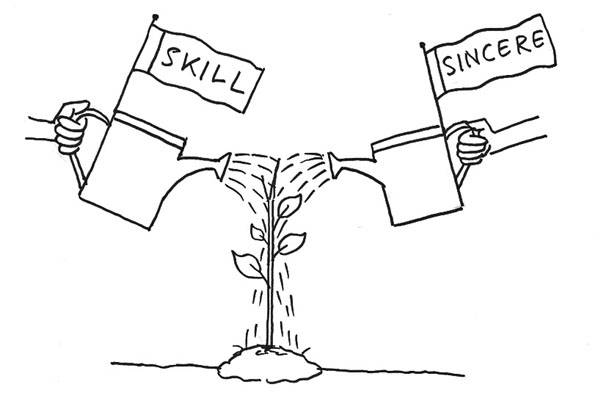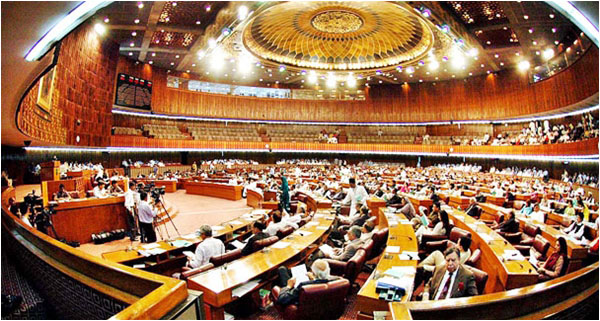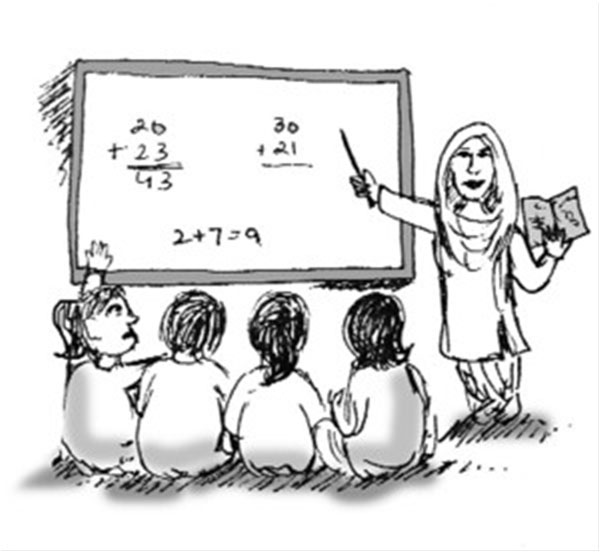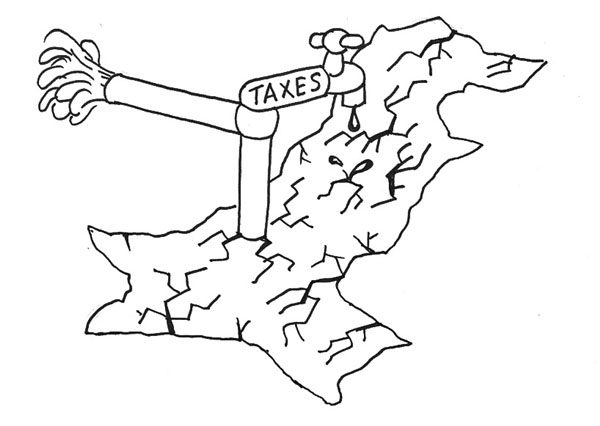
Agriculture going down
Sir,
Arable land and water are principal natural resources of Pakistan. According to the United Nations Food and Agriculture Organization (FAO) and FAOSTAT, Pakistan stands among the world’s largest producers and supplier countries as the third in Chickpea, fourth in Cotton, Rice and Mango, fifth in Milk, Date Palm and Sugar Cane, sixth in Kinnow, Mandarin Oranges, and seventh in Wheat and Onion production. The country still has the world’s largest irrigation system.
The output of the agriculture sector has contracted in the outgoing fiscal year, instead of showing growth, for the first time in decades. The gross domestic product (GDP) grew by 4.7 per cent against a target of 5.5pc. This shows the widespread dismal performance by the agriculture sector. It is the third consecutive year that Prime Minister Nawaz Sharif’s administration has missed the most important and critical economic target.
Prime Minister Nawaz Sharif, in September last year, announced the Rs341 billion Kissan Relief Package to support our rural economy; especially those rice and cotton growers who faced losses in agriculture produce due to high input costs. This package was not proved to be fruitful.
The government should make an integrated framework for the growth of the agriculture sector with a view to achieving positive outcomes. Serious intervention is required at the policymaking level. The areas to be targeted in the proposed integrated framework included promotion of new crops and modern techniques, revitalization of agricultural research institutions, re-establishment of the research system by synergizing federal and provincial institutions, re-origination of research for developing better crop varieties in terms of yield and disease and pest persistence, new system of funding with a focus on research output rather than investing in buildings and unnecessary employment, measures for mitigating impact of climate change on the sector, a long-term groundwater policy aimed at ensuring availability as well as efficient utilization of this scarce resource, a comprehensive framework for seed certification, fertilizer availability at affordable rate and regulation of the pesticide business.
Engr Mansoor Ahmed,
Lahore.

Good omen
Sir,
The groundbreaking ceremony of the Central Asia-South Asia-1000 (CASA-1000) power project took place in Tajikistan on Thursday, on May 12. It was truly heartening to see Pakistan’s premier Mian Nawaz Sharif, Tajik President Emomali Rahmon, Afghanistan’s Chief Executive Abdullah Abdullah and Prime Minister of Kyrgyzstan Sooronbay Jeenbekov jointly launch the project at an impressive ceremony, organized to mark the formal launch of the project, near Dushanbe.
The CASA-1000, it is said, is a flagship project, and the first of its kind that will link Pakistan, Afghanistan, Tajikistan and Kyrgyzstan through a power grid. Speaking at the groundbreaking ceremony, Prime Minister Nawaz Sharif said that the CASA-1000 was an important joint venture project in the region connecting Central Asia, Afghanistan and South Asia through the electricity grid. Upon completion of the project, Pakistan and Afghanistan would obtain 1,000MW and 300MW of electricity, respectively, in the summer from Tajikistan and Kyrgyzstan, from hydel resources. The CASA-1000 project is expected to bring a number of economic and environmental benefits, help reduce the energy deficit, improve trade and business links besides promoting friendship among partner countries. It wouldn’t be inappropriate to say that the project would bring the cooperating countries closer to each other and open new avenues for mutually beneficial economic collaboration.
Power shortage is a grave problem confronting Pakistan since decades. The problem, in fact, continues to grow by the day and seriously retard the country’s economic growth. Needless to say, it also has a terrible impact on the people of this country who have to face long hours of power outages, particularly during the summers. Pakistan urgently needs to come out of its power crisis if it desires to attain its developmental goals successfully and alleviate the sufferings of its people. The CASA-1000 project launched near Dushanbe, Tajikistan on May 12, 2016 is a ray of hope for Pakistan to partially get out of its long-drawn power crisis. This, however, should not encourage complacency among those managing the power issue in the government. In fact, CASA-1000 should form a basis for carving out and implementing similar projects or projects of greater magnitude to overcome the debilitating power shortage in the country as quickly as possible.
M Fazal Elahi,
Islamabad.
NA speech
Sir,
Reference PM Nawaz Sharif’s speech in the NA on May 16, where he disclosed that the Sharif family sold their Dubai located Steel Mill built in 1980 for $9 million. On February 27, 1997, PM Nawaz Sharif launched the National Debt Retirement Scheme to solicit funds from non-resident Pakistanis and resident Pakistanis asking them to submit their foreign currency accounts, FEBCs, FCBCs, traveler cheques, remittance from abroad or simply surrender foreign currency as either an outright donation or Qarz-e-Hasna deposits for a minimum period of two years with the option to take the principal amount in Pak Rupees, or profit bearing deposit for a minimum of two years. Yet the PM knowingly chose to keep his family-owned $9 million out of Pakistan. Does this not constitute hypocrisy and deliberate concealment unbecoming of a person holding the office of PM of Pakistan. This has raised more issues of credibility and integrity than resolved doubts arising after the disclosure of the Panama Leaks.
I suggest that the “Islamic Republic of Pakistan” be changed to “Emirates of Pakistan”, where we elect sultans who are neither answerable to the people, nor the National Assembly, exempt from paying taxes, but yet have a moral and legal right to rule a country that they do not consider safe for their families to live in, or their assets to be located in. This unfortunately seems to be the outlook and mindset of a large majority of our political elite and paid civil or uniformed bureaucracy, who have held high offices in the recent past. It is primarily an Islamic code of ethics set by Hazrat Abu Bakr that rulers and public office holders cannot indulge in trade nor be the beneficiary of any business during the tenure of their public office.
Malik Ali,
Lahore.
Irony abound
Sir,
The government has been advertising since the last many days on numerous television channels its claim of saving Rs215 billion in various infrastructure projects. How can the people of Pakistan believe the accuracy of the government’s claim of saving Rs215 billion when there is no independent verification available for this claim? I can’t count how many times in a day this advertisement of saving is repeated on dozens of television channels and it has been running since many days, costing perhaps billions in taxpayer money. I think spending billions of rupees on an advertising claim of saving defeats the very purpose of saving, which the government is claiming in this advertisement.
Ejaz Ahmad Magoon,
Lahore.
NA debates on Panama
Sir,
Reference the ongoing debates and counter arguments by members of NA, the only conclusion that one can draw is that corruption should be allowed to nourish and grow in this country. If the argument that those whose name is maligned with allegations of corruption and who had previously been involved in money laundering and transferring funds to buy property abroad cannot stand up and point a finger at the PM, then it must be assumed that for all practical purposes, Pakistan is a country where those who hold public offices can continue to do so, as long as the crimes they committed have also been done by other members of the elite who have been in power.
Yet, despite such hypocrisy, we continue to claim that Pakistan is an Islamic state, where all laws must be in accordance with Quran and Sunnah. It really doesn’t matter if we violate those laws, abuse powers and involve in corruption and bribery, irrespective of what Islam or our constitution and laws state. In this country, state or private land can be forcibly acquired by the powerful elite and land mafia, and nothing will happen other than the farce of a plea bargain to regularize every irregularity and illegality, which no religion allows, nor does the constitution. If this is the attitude then we must fear the wrath of God.
G Zaman,
Peshawar.

Corruption in Pakistan
Sir
Much is being said about the effects of the Panama leaks on the politicians of Pakistan, but rest assured nothing is going to happen to these well-fed politicians, government officials and unethical business magnates, simply because in Pakistan these days it is the government by the corrupt, of the corrupt, and for the corrupt. Those who are supposed to take action against these people are themselves corrupt.
So, enjoy the corruption; speak not, bury yourself in the heap of corruption, for you yourself voted for corruption, and chose a party which already had a record of corruption.
Rafiq Ebrahim Valjee,
USA.
Right models, wrong approach
Sir,
If Prime Minister Nawaz Sharif wants Pakistan’s economy to develop and adopt Turkey or China as role models, than he must understand that all this was possible after they had developed their human resource and employed best in fields of science, technology and economics to head various state owned enterprises. Nepotism, conflict of interest and cronyism dictating the choice of men to head state institutions in Pakistan are the biggest impediment to progress.
China has taken decades, lead by men like Mao and Chou en Lai to become the economic giant that it is today. Those who have visited China in the 1970s and 1980s would remember that there was no semblance of luxury, no imported goods, and no extravagance, unlike Pakistan, where while more than half the population lives below the poverty line, our public servants live like royalty at state expense –which many in developed West would never dare to emulate because of fear of censure and accountability.
Therefore the best we can do is follow the Turkish model. For starters, compare the academic professional qualifications, experience and integrity of the senior executives of Turk Hava Yollari, their national airline, with those put at the at helm in PIA by Musharraf, Asif Zardari and now Nawaz Sharif. Or compare the qualifications of their advisors on economy, planning commission, science, water & power, health, education, highways, or railways with the individuals who do the same jobs in Turkey. It is not that Turkey is a country free from corruption, or a country that has had decades of democratic governance. It is a nation where democracy and institutions have developed only recently. Yet they have a far better monetary and fiscal discipline regulated by qualified economists, not commercial bankers, and an independent auditor-general.
Turkey is a Muslim majority country relatively free of sectarian or ethnic violence because political parties, the establishment and the media refrain from exploiting religion. Turkey has progressed because even military dictators that preceded democratically elected government stressed the development of human resource. In Turkey, the business community is forced to adhere to ethics, through strict regulatory controls, although their foreign investments are not subjected to similar discipline.
Bilal Anwar,
Karachi.

Women’s world
Sir,
The connections between globalization and women’s education have never been more under the public gaze, but much of the debate on the issue has been superficial. It could be argued that all too often, the messages communicated are distorted via ‘western perceptions’. Women educationalists have a responsibility therefore to ensure that the voices of the women and marginalized are heard.
Globalization is having an increasingly direct impact upon people’s lives. It is also becoming relatively easier to access information about global issues. Educationalists can no longer argue that ‘education’ and ‘globalization’ are separate. People are more aware of global issues now, but how do they decide as to how they will critically assess the information they receive? That is why women’s education and development is so important.
Women’s education will help them understand their own self and situation in a wider context, make connections between local and global events, develop skills and knowledge to interpret events affecting their lives (for example sexual abuse and harassment), understand the cause of global inequality and justice, combat racism and xenophobia, widen their horizons, and make a difference in their worlds by participating in the society.
It is often where women educationalists have engaged in broader debates that progress has been made. Through a range of international and national policies and programmes, the term ‘global’ is becoming part of everyday language of educationalists.
Women’s education should also offer a range of perspectives and views. It needs to be perceived as making connections between local and the global values based on equity, social justice and women’s rights. In order to achieve this, women development educationalist should see their role as people who can influence societies and empower women to develop the skills, knowledge and values that can make connections between their own lives and those of people elsewhere in the world.
Only then will societies promote learning that creates a better understanding of women’s inequality in the world and gives women the skills and value base to enable them to create their own voices and forms of engagement to secure their social lives.
Rameesa Khan,
Lahore.

Crux of Panama
Sir,
Reference the ongoing debate and series of allegations and counter allegations traded between the PML-N and the opposition. As far as the people of Pakistan are concerned, their sole interest is to stop flight of capital, tax evasion and limit the damage inflicted upon our economy by members of the political elite, traders and civil or uniformed bureaucracy. If individual citizens of Pakistan choose to move their assets and families to foreign safe havens, then such people have no right to hold elected or paid public offices, where the fate of millions living in Pakistan is to be decided.
The unfortunate reality is that 90% of our foreign remittances comprise money sent by expatriate community who do not hold foreign nationalities to support their families back home. A majority of them are working in the Gulf, Mideast and Far East. The problem is that almost 80% of these foreign remittances are transferred by the few elite who work or do business in Pakistan, almost 95% of them holding their assets abroad where their families live. So powerful and well entrenched are these vested lobbies that the State Bank and other state institutions turn a blind eye to advertised collection of billions by real estate dealers based in the Gulf from the elite to buy properties abroad, although they pay nominal taxes in this country where they have earned the same money through legal or illegal means.
If any Pakistani citizens has earned money abroad and to save payment of taxes in that foreign country they operate through offshore companies, it does not harm the economy of Pakistan. Our problem is money transferred through money laundering, illegal channels and loopholes built in within rules to facilitate the transfer of hard foreign exchange from Pakistan, depriving this country of taxes and reinvestment which should have been made in this country. Billions are being siphoned from this country, and the lack of revenue generation through direct taxation is a hurdle in socio economic development schemes to develop our human resources by investing in education and health. This organized and institutionalized corruption depletes our economy of vital finances, adding to the ranks of unemployed youth, who are falling prey to recruitment by terrorists.
Ali Tariq,
Lahore.

